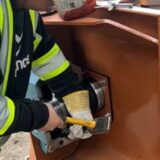Why Pipe Fitters Are Essential on Every Industrial Construction Site
Introduction
In the world of industrial construction, successful project execution depends on more than just heavy machinery and steel frameworks. One of the often-underappreciated roles is that of the pipe fitter. These skilled professionals play a critical part in ensuring the infrastructure functions safely and efficiently. Whether it’s for a manufacturing plant, a refinery, or a mining facility, having an experienced pipe fitter on-site is not just helpful—it’s essential.
Who Is a Pipe Fitter?
A pipe fitter is a tradesperson who installs, assembles, fabricates, maintains, and repairs mechanical piping systems. These systems are commonly used to transport water, steam, gas, oil, chemicals, and other substances in industrial settings. Pipe fitters are not the same as plumbers; while both work with piping systems, pipe fitters typically focus on high-pressure or hazardous systems used in industrial or commercial facilities.
Key Responsibilities of a Pipe Fitter
Pipe fitters bring a mix of technical knowledge and hands-on skills to the construction site. Their core responsibilities include:
- Reading blueprints and technical drawings to understand the pipe layout
- Cutting, threading, and bending pipes to exact specifications
- Welding or joining pipes using a variety of tools and methods
- Installing supports and hangers to ensure system stability
- Conducting pressure tests and safety checks to meet regulatory requirements
Their work ensures that piping systems are installed correctly, function as intended, and meet all safety and quality standards.
Why Pipe Fitters Are Critical in Industrial Construction
1. Handling Complex Systems
Industrial construction projects involve large-scale, complex systems that require precision. Pipe fitters are trained to understand and work with high-pressure piping systems, boilers, and industrial processing lines—components that are essential to the operation of facilities like factories and power plants.
2. Ensuring Safety and Compliance
In any industrial construction project, safety is a top priority. Faulty or poorly installed pipes can lead to dangerous leaks, system failures, or even explosions. A skilled pipe fitter ensures that the entire piping system is installed safely and complies with local and national safety standards, reducing the risk of accidents and costly delays.
3. Supporting Energy Efficiency
Pipe fitters play a vital role in the energy performance of a facility. Properly installed piping systems reduce leaks, improve insulation, and enhance overall system efficiency. This has a direct impact on operating costs and long-term sustainability goals.
4. Minimizing Downtime
During construction or maintenance, time is money. Pipe fitters help streamline the process by quickly identifying issues, making precise installations, and reducing the chances of rework. Their expertise ensures that projects stay on schedule.
5. Adaptability to Industrial Settings
Every industrial construction site presents unique challenges—tight spaces, high temperatures, or exposure to hazardous materials. Pipe fitters are trained to adapt to these environments while maintaining quality and safety.
Industries That Rely on Pipe Fitters
The demand for skilled pipe fitters spans various industries, such as:
- Oil and gas
- Chemical manufacturing
- Food processing
- Power generation
- Water treatment
- Mining and agriculture
Each of these sectors depends on reliable piping systems, making the pipe fitter an integral part of the construction and maintenance teams.
Skills That Make a Great Pipe Fitter
To succeed in the role, a pipe fitter must bring a combination of:
- Technical knowledge of piping systems and materials
- Strong problem-solving skills to troubleshoot installations
- Attention to detail for accurate cuts, angles, and fittings
- Physical endurance to work in demanding environments
- Awareness of safety practices and regulatory standards
Conclusion
The presence of a skilled pipe fitter on an industrial construction site can make the difference between a project that runs smoothly and one that suffers costly setbacks. Their expertise in managing complex piping systems, maintaining safety, and improving efficiency is invaluable. As the industrial construction industry continues to grow, so does the need for reliable, experienced pipe fitters who can meet the evolving demands of modern infrastructure. For any construction project aiming for durability and operational excellence, a pipe fitter is not just a trade professional—they’re a key player in the team.



